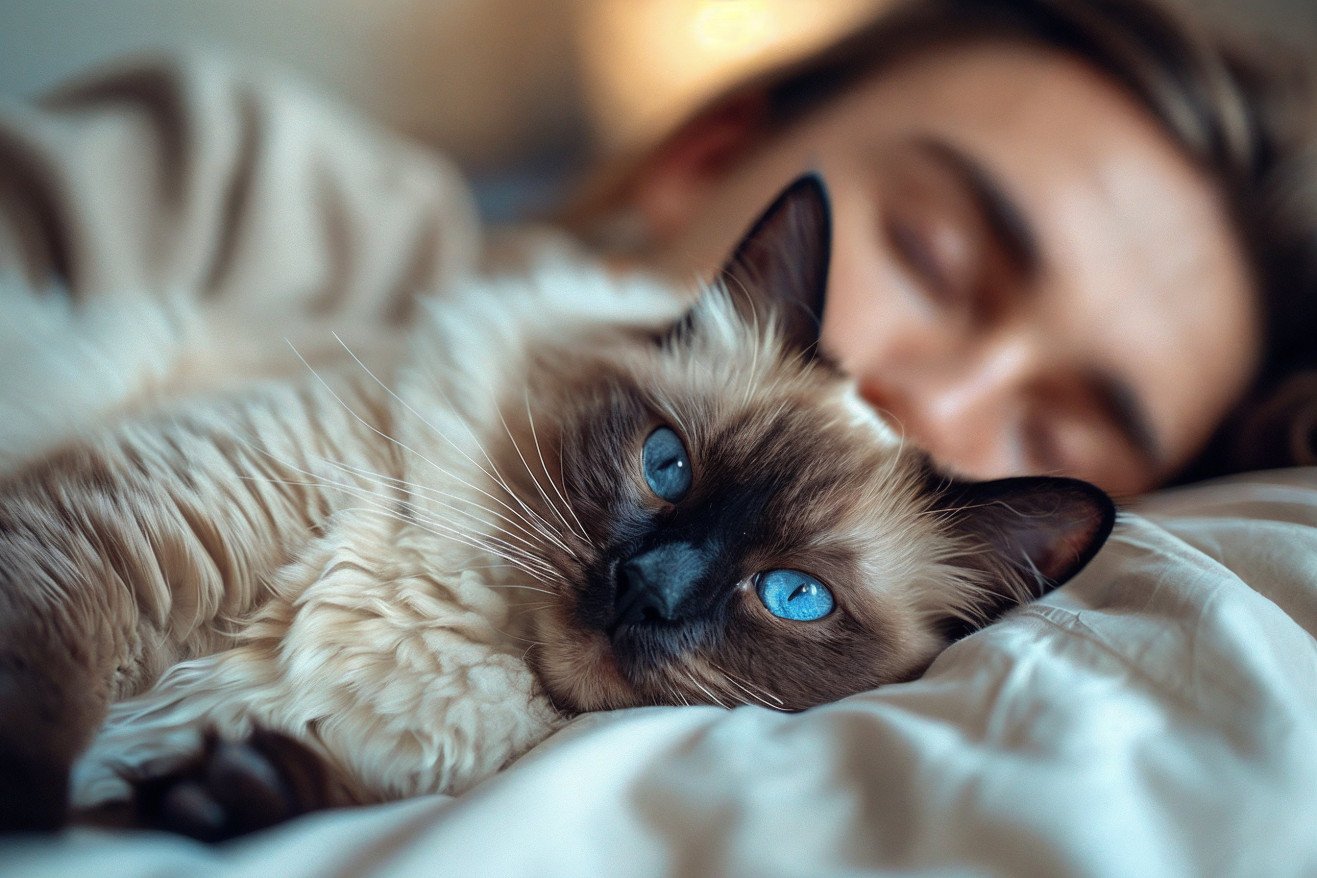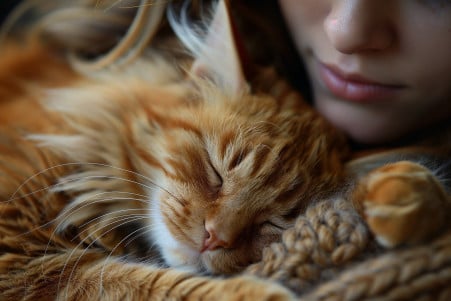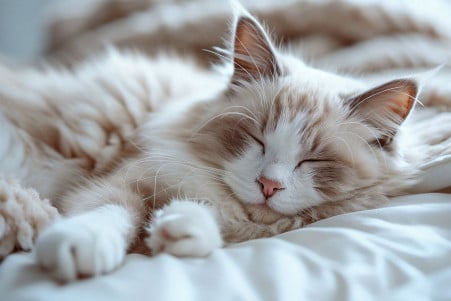Why Is My Cat Suddenly Sleeping Next to Me? Unpacking Clingy Cat Behavior
23 May 2024 • Updated 23 May 2024

Your once-independent feline suddenly wants to snuggle up beside you 24/7 - but what's behind this clingy new behavior? Cats may sleep next to their owners to seek warmth, comfort, and security, especially if they are feeling stressed, anxious, or under the weather. Changes in routine, loud noises, and environmental shifts can disrupt their sense of safety, driving them to seek out the reassuring presence of their favorite human.
While exploring research from veterinary experts, animal behaviorists, and pet care resources, we'll uncover the common reasons why cats forge these cozy sleeping bonds with their owners. You'll learn how to interpret this behavior change as a sign of trust and affection from your furry companion. We'll also provide tips on gently re-establishing boundaries while meeting your cat's underlying needs during this snuggly phase.
Why is my cat suddenly sleeping next to me?
The Warmth and Security of Co-Sleeping
It's hard to resist the idea of your cat snuggling up with you in bed, and it turns out that cats are drawn to the idea as well. According to the CatNip Times, cats are attracted to the warmth and comfort of their owner's body heat, which makes the bed an especially appealing place to sleep. Since cats have a higher body temperature than humans, they need to be in a warm environment to maintain their ideal body temperature, and your bed can provide that.
Yet, it's not just the physical warmth that makes co-sleeping so appealing to cats. SHEBA® UK explains that co-sleeping with you also fulfills your cat's natural instincts for security and protection. Even if you live in a home without predators, your cat may still consider your bed to be part of their territory, which they need to protect, as the CatNip Times explains.
For cats that suffer from separation anxiety or other forms of stress when they're alone, co-sleeping can provide a sense of security and comfort as well as strengthen the bond between cats and their owners. However, it's important to keep in mind that there are potential downsides to co-sleeping, including the potential for your cat to wake you up in the middle of the night and the potential for your cat to track dirt and other contaminants into your bed, as noted by SHEBA® UK. By understanding why your cat wants to co-sleep, you can decide whether or not it's a good idea for you and your cat.
How to Tell If Your Cat Is Stressed or Anxious
While your cat's clingy behavior may be a sign of affection, it could also be a sign of stress or anxiety. Catster notes that other signs of stress in cats include hiding, over-grooming, a change in appetite, aggression, and urinating or defecating outside the litter box. In addition, cats may also display physical signs of stress, such as dilated pupils, flattened ears, and a stiff body posture.
It's important to figure out the cause of your cat's stress, whether it's a change in their environment, a change in your schedule, or a conflict with another pet. Petplan suggests that you can help reduce your cat's stress by providing environmental enrichment, sticking to a routine, and using calming pheromone products. In addition, PetMD notes that taking your cat to the vet to rule out any medical issues and working with a professional trainer can also help you manage your cat's stress.
Once you know the signs of stress in your cat and have figured out what's causing it, you can help your cat feel more secure and reduce their need to be clingy.
Setting Boundaries and Training Cats to Sleep Independently
If you'd rather not co-sleep with your cat, there are ways to train them to sleep on their own. Katzenworld recommends placing a cat bed in a quiet, private area and using positive reinforcement, such as treats and praise, to encourage your cat to sleep there.
LifeWithCats.tv advises pet parents to gradually introduce a new bed and make their own bed less comfortable to discourage co-sleeping. Meanwhile, Bunty Pet Products stresses the importance of being consistent, patient, and addressing any potential stress or anxiety issues to train a cat to sleep in their own bed.
How to Adjust to Your Cat's Changing Sleep Patterns
A cat's sleep patterns and needs can change as they go through different life stages, from kittenhood to old age. Kittens, for example, need more sleep, sometimes as much as 22 hours a day, because they are growing and developing so quickly in their first few months, according to Heron's Crossing. Meanwhile, adult cats sleep between 12-18 hours a day, and their sleep is often in sync with their crepuscular nature, according to the Sleep Foundation.
When cats are seniors, they may sleep as many as 20 hours a day because they are slowing down and need to conserve their energy, according to Heron's Crossing. However, too much sleep can also be a sign of health problems, so it's important to keep an eye on your cat's sleep habits. Severn River Animal Hospital notes that it's important to make sure your cat has the right environment to sleep in, including warm, cozy places to rest, and the right amount of exercise at every stage of life to ensure their health and happiness.
Conclusion: How to Maintain a Healthy, Balanced Relationship With Your Cat
While co-sleeping with your cat can help you bond with them, it's also important to make sure that you're maintaining a healthy relationship and allowing your cat to maintain their independence. This can be done by making sure that your cat has their own spaces, like beds and scratching posts. In addition, making sure that your cat is getting enough play, exercise, and mental stimulation can help make sure that your cat doesn't become too dependent on you.
If your cat's clingy behavior seems to be a result of stress or anxiety, it's important to talk to a vet or animal behaviorist to make sure that there isn't an underlying medical or behavioral issue. However, with a little patience and understanding, you can make sure that your cat's needs are being met while also making sure that you're not feeling overwhelmed by your cat's clingy behavior.


